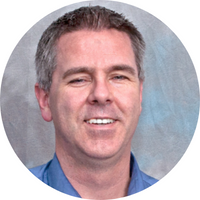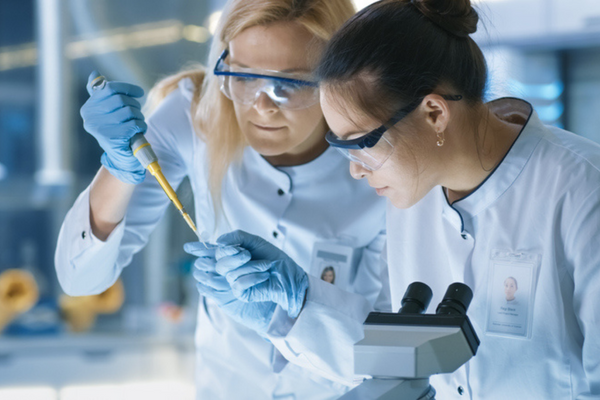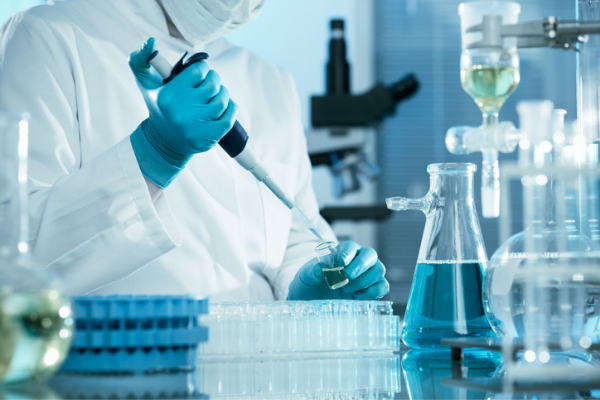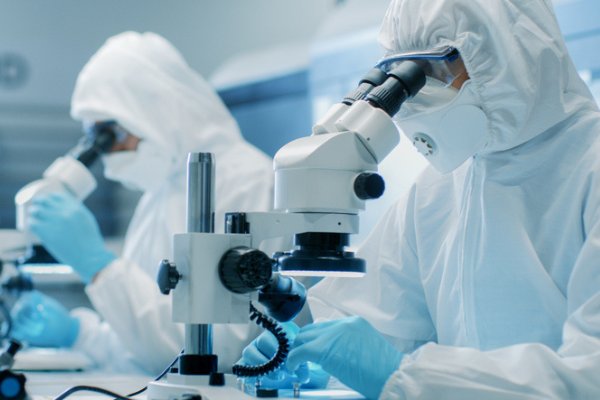
Electron transfer in liquid crystals and gel-breaking in hydraulic fracturing don’t seem to have a natural connection. Describe how laser spectroscopy prepared you for a career in the oil patch?
The one practical overlap between the work I carried out in my graduate studies on photoactive products for liquid-crystals and in the chemistry of upstream oil and gas applications is the need to always stay aware of and grounded in the logistical challenges of large-scale deployment. When carrying out chemical and fluid optimization in the laboratory, it’s easy to lose track of how difficult it may be to optimize the separation, blending, or deployment of these chemicals in the harsh conditions of large scale operations.
Take me back to when you were seeking employment after graduate school. How were you able to land that first job? What do you think got you hired?
It’s no surprise that most folks finishing graduate school begin their professional careers in a technical area unrelated to their university research. That was certainly the case for me.
In 2004, an oilfield service company was hiring for their oilfield chemicals division at a Northwestern recruitment event. Due to the highly specialized nature of the chemistry they work in, along with the low number of academic programs that specialize in that field, they were looking for two critical skills: first, the ability to rapidly climb the learning curve to contribute in an unfamiliar technical field, and secondly, the ability to clearly explain the findings and impact of a technical study to a nontechnical audience.
Thanks to a lot of great coaching from my graduate advisor, I did well in both of those areas, so it was a natural fit. I’ve continued to hone those skills ever since!
What most surprised you about the chemistry related to oil production and what are some of the remaining challenges?
The biggest surprise in this field is the need to collaborate with such a wide network of colleagues from different technical fields to make a well-rounded study or technical advancement. My projects require working with geologists, petroleum engineers, facilities engineers, data scientists, experts in fluid mechanics, and many others.
What’s more, the network of colleagues that I regularly work with spans across the globe and provides many great opportunities for cultural exchange and learning and much added richness to the collaboration.
Regarding ongoing challenges, there are many conditions in our reservoirs that would benefit from advanced chemical expertise. For example, significant work is underway to develop materials, such as fluids, metallurgies, and elastomers for use in extreme high-pressure, high-temperature (HPHT) reservoir conditions. Additionally, various methods continue to be developed for improved recovery of hydrocarbons from shale and tight reservoirs.
The shale revolution revitalized the U.S. chemical industry. Some doubt the ability to sustain an advantage. Their arguments seem to fall into either skepticism about the ability to sustain U.S. production or that shale basins around the world will increasingly be put into production, eroding the U.S. advantage. What does your crystal ball tell you about the future of U.S. and global energy?
From my technical career perspective and my experience in domestic and global energy projects, I see a broad energy mix from various sources that range from traditional hydrocarbon all the way to more recent low-carbon energy sources.
There is still a lot of reservoir potential in North American onshore reservoirs, including shale basins that vary from international sources in their cost-per-barrel. The ongoing improvements in efficiency, infrastructure, and technology to drill, complete, and produce from North American shale and tight assets could yield further reductions in the cost to produce domestic energy.
The International Energy Agency projects increased domestic and global energy demand over time, and I expect the production from North American reservoirs will remain an important part of the overall energy supply mix for years to come.
What is the one personality trait that has been most instrumental in your career success? What trait do you wish you had in greater supply?
One trait that has allowed me to contribute (despite numerous industry fluctuations) is my commitment to learn and innovate beyond my technical comfort zone. Early-on I realized that just building expertise in oilfield chemistry would not be sufficient, so I spend time learning about the chemistry and chemical-delivery methods in other industries such as cosmetics, water treatment and pharmaceutical. It turns out that many of those methods hadn’t been considered for oil and gas applications and would actually improve delivery of chemicals for those applications.
The one trait I would like to further develop is my ability as a skilled and active listener for colleagues and peers in the broader technical community. This is an important part of mentorship for younger professionals and is also critical in building a reputation of trust and integrity among peers. As much as I’d like to continually help folks find solutions, sometimes it’s more important to just listen. Listening and asking questions can lead people to reach their own conclusions and see breakthroughs and “lightbulb moments” on their own.
How has your family influenced your leadership style?
I’m the oldest of three brothers, and I learned a lot of lessons the hard way growing up; I had a lot of opportunities to mentor my brothers based on my experiences as they grew into young men, but I was often too hard-headed or didn’t know how best to share those lessons.
Since then, I have learned better ways to message those kinds of lessons. For example, as I entered my graduate studies, I was fortunate to get some great technical mentors and role models, which both illustrated the importance of communication and messaging, but also helped me to realize the importance of technical mentorship in a scientific setting.
I have since had amazing technical mentors throughout my professional career, and I try to pay it forward and take every opportunity to share my career learnings to mentor young professionals who have recently entered or are considering upstream oil and gas industry. I enjoy sharing my experience, perspective, and technical learnings.
While those mentoring relationships have ranged from informal to formal engagements, I’ve tried to be an objective, independent resource for advice and mentoring in whatever way is most suitable for those I am mentoring.
What non-technical skills have you most relied on to-date for your career advancement?
I’ve been lucky enough to practice a lot of public speaking, starting with high school theater and now presenting technical materials. While I’ll always second guess my abilities as a presenter, this practice has taught me how to be a better communicator.
I’ve learned that communication and presentation skills make up 49% of the impact in even the most technical of roles.
Whether proposing a new invention to a room of executives, or discussing fluid-rock interactions in hydraulic fracturing with my mother, clearly communicating technical material so that audiences of varying technical backgrounds can understand will always be a great skill no matter where you are in your career.
You have spent countless hours in numerous volunteer roles for ACS, SPE and other organizations. Why?
First, relative to what I get in return from these great professional organizations, I feel that the time I put in is small. These organizations are a great resource for members to learn and network, through the groups like SPE’s Members in Transition group which provide support and resources for members who are between jobs.
In reality, the success of those organizations is only achieved through active engagement of the membership. I try to help if I can, be it through mentoring petroleum engineers entering the industry or by chairing conference sessions.
From a technical perspective, because my career has straddled petroleum engineering and chemical sciences, I have found it’s important to represent each discipline in technical engagements with the other disciplines. Greater awareness of the latest studies in the chemical sciences by petroleum industry professionals can yield technology development to improve the transition to a low carbon future; and improved awareness of methods of energy extraction and development can lead to more well-rounded chemical professionals.
You are a member of the Chemical Sciences Roundtable (CSR) at National Academies of Sciences, Engineering, and Medicine. What challenges is the roundtable currently addressing?
The team at the academy has been working diligently to build programming that is enriching for professionals who work in the chemical sciences. And while the programming at the Academy has always had free virtual session registration, the pandemic has led to bigger demand for virtual programming in the chemical sciences.
At the time of this interview, the Chemical Sciences Roundtable is organizing a workshop about Diversity, Equity and Inclusion in Chemistry and Chemical Engineering, which is a critical topic for chemical professionals and the future of this industry. In scoping out this workshop, the CSR members recognized that improvements in inclusion and equity are important not just for the continued success of our industries, but for current students and future generations of scientists and chemical professionals who are watching to see how we evolve and improve in these areas. To that end, the workshop has some high impact speakers and panels scheduled that will bring some diverse perspectives and discussion to these topics.
Later in 2021, we will be hosting an interactive workshop on laboratory automation, which has seen some great advances in capabilities and large-scale deployment in recent years. Where previously the focus was just on high-throughput experimentation, the field of automation in synthesis and characterization has identified ways to access new compounds previously deemed unreachable.
As such, this workshop will present great examples of automation in industrial and academic settings and will cover the ways that academic programs in the Chemical Sciences have modified curricula to integrate principles of laboratory automation.
What’s the most significant sustainability issue confronting Chevron? What is the plan to address it?
One sustainability challenge around which there has been a great deal of development in recent years is water usage in upstream operations.
For example, Chevron significantly reduced the use of fresh water to support our hydraulic fracturing operations in West Texas and New Mexico, allowing this scarce resource to be used for other important applications. Technology advancements in water treatment and in the chemistry of fracturing fluids now allow for all types of water to be used in fracturing— including saline water. In fact, today, 99% of the water used in our Permian Basin operations is water that comes from non-fresh water sources, including brackish and recycled water.
What’s the one thing about which you most often say, “Well, maybe one day”?
I joke that one day I’ll finally make some tangible plans for retirement and track down a beautiful plot of land far off the grid…. but in reality, I’m having so much fun working and have so many things I still want to accomplish! I have many ongoing plans to develop techniques and compounds that will make our operations safer, more efficient, and more sustainable that I haven’t had time yet to even consider retirement.
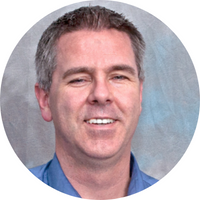
Michael J. Fuller is a Senior Completions Subject Matter Expert (SME) in the Chevron Technical Center (CTC), where he works in materials, fluids, and methods for completions, drilling, and stimulation operations as a part of the CTC Wells team. In his 17 years working in global roles in the upstream oil and gas field, he has been issued numerous issued patents and produced numerous industry publications.
He holds a PhD in Chemistry from Northwestern University (2004) and a BS in Business Chemistry from Northern Illinois University (1999).
He currently serves as co-chair for the Chemical Science Roundtable at the National Academy of Science, Engineering, and Medicine and chair of the API committee for development/revision of API RP 19D.
Copyright 2021 American Chemical Society (All Rights Reserved)
This article has been edited for length and clarity. The opinions expressed in this article are the author's own and do not necessarily reflect the view of their employer or the American Chemical Society.

